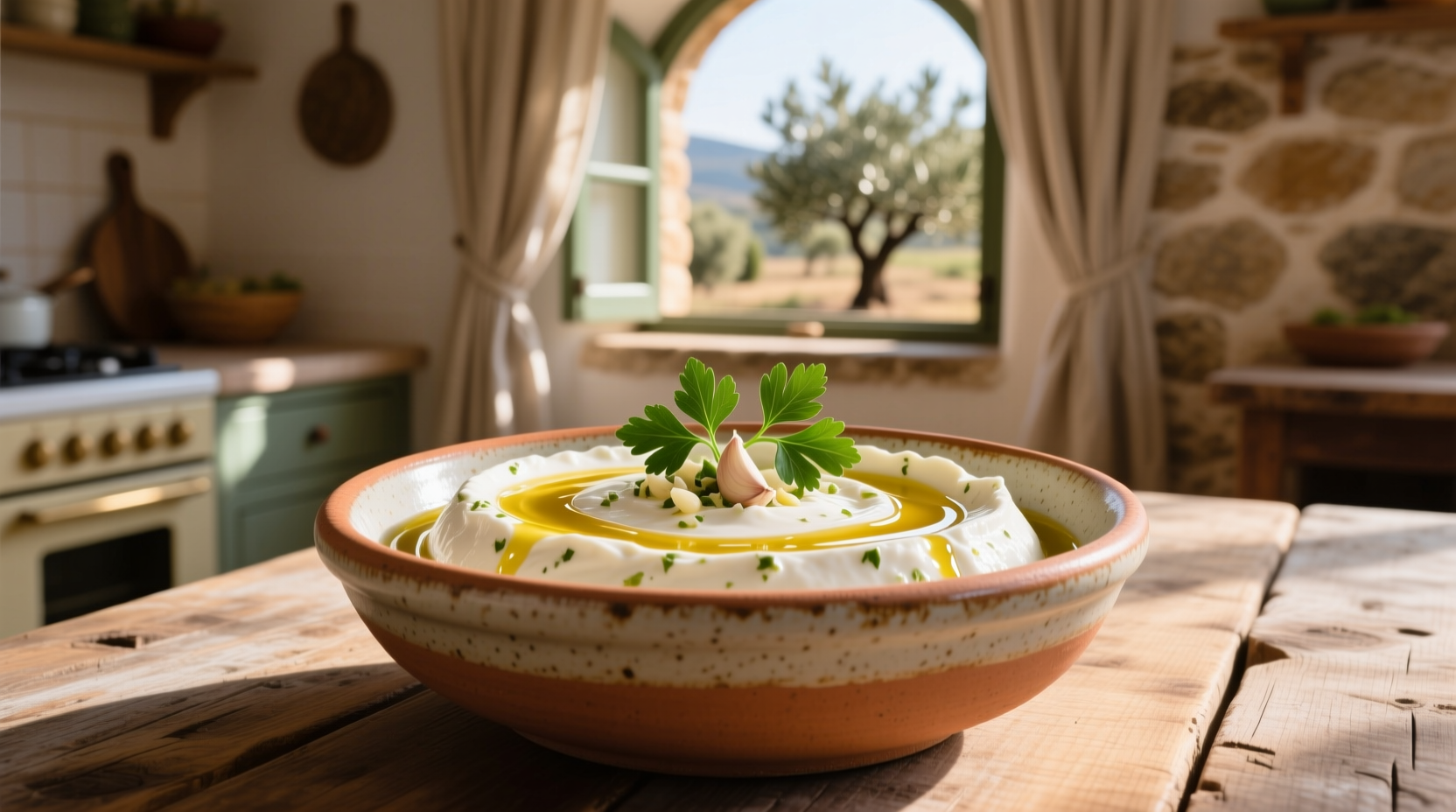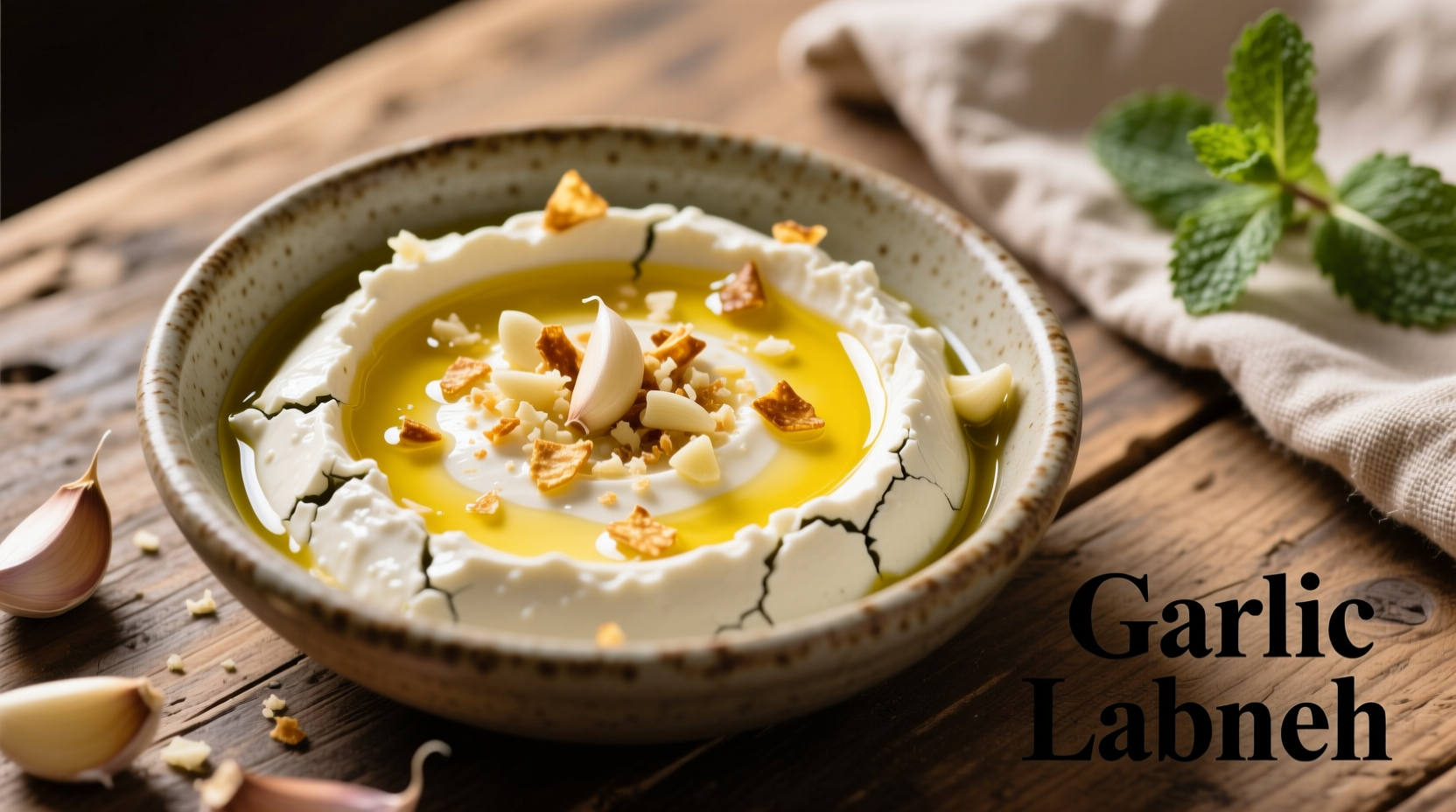Discover why garlic labneh has become a staple in Mediterranean kitchens and how this simple preparation elevates everyday meals with its rich, tangy flavor and impressive nutritional profile. Unlike ordinary yogurt dips, properly made garlic labneh delivers a luxuriously thick texture that holds its shape while spreading smoothly, making it versatile for everything from breakfast toast to dinner accompaniments.
The Evolution of Labneh: From Ancient Preservation to Modern Staple
Labneh's history spans centuries across Middle Eastern culinary traditions. Originally developed as a preservation method for milk in warm climates, this strained yogurt technique evolved from simple household preparation to a cornerstone of Levantine cuisine. Historical records show similar strained dairy products existed in ancient Persian and Ottoman culinary practices, with regional variations developing over time. The addition of garlic—a common flavor enhancer throughout Mediterranean cooking—transformed basic labneh into a distinctive condiment that complements grilled meats, vegetables, and breads.
Essential Ingredients for Perfect Garlic Labneh
Creating authentic garlic labneh requires just five quality ingredients:
- Full-fat Greek yogurt (32 oz) - provides the base with proper fat content for rich texture
- Fresh garlic cloves (3-4 medium) - freshly minced delivers superior flavor to pre-minced
- Extra virgin olive oil (3 tbsp) - adds richness and prevents garlic from oxidizing
- Fresh lemon juice (1.5 tbsp) - balances the tanginess and enhances flavor
- Sea salt (¾ tsp) - to taste, enhances all other flavors
For optimal results, use high-quality, full-fat yogurt without stabilizers or thickeners. The natural straining process concentrates both flavor and texture, creating that signature labneh consistency that ordinary yogurt cannot achieve.

Step-by-Step Preparation Guide
Follow these professional techniques for restaurant-quality garlic labneh at home:
- Strain the yogurt: Place yogurt in a cheesecloth-lined sieve over a bowl. Refrigerate for 24-48 hours until thickened to cream cheese consistency. This critical step removes excess whey, concentrating flavor and texture.
- Prepare garlic: Mince garlic finely and let it rest for 10 minutes. This allows enzymatic reactions that develop more complex flavor compounds while mellowing harsh raw garlic notes.
- Combine ingredients: In a medium bowl, mix strained labneh, garlic, lemon juice, and salt. Fold gently to maintain texture—avoid vigorous stirring which can make it watery.
- Rest and develop flavor: Cover and refrigerate for at least 2 hours (preferably overnight) to allow flavors to meld. The garlic flavor will mellow and integrate perfectly with the tangy labneh.
- Final presentation: Transfer to serving dish, create a shallow well in center, and generously drizzle with olive oil. Optional garnishes include fresh mint, za'atar, or a sprinkle of sumac.
Storage Guidelines and Food Safety
Proper storage ensures both safety and quality of your garlic labneh. According to the USDA Food Safety and Inspection Service, homemade dairy products like labneh should be stored at or below 40°F (4°C) and consumed within 7-10 days. The high acidity of properly prepared labneh creates an environment less hospitable to harmful bacteria, but proper refrigeration remains essential for food safety. Always use clean utensils when serving to prevent contamination, and never leave garlic labneh at room temperature for more than two hours.
Nutritional Comparison: Labneh vs. Common Alternatives
| Product (per 2 oz serving) | Calories | Protein | Fat | Carbs | Probiotics |
|---|---|---|---|---|---|
| Garlic Labneh | 120 | 6g | 9g | 3g | High |
| Greek Yogurt | 110 | 12g | 0g | 6g | High |
| Sour Cream | 50 | 1g | 5g | 1g | None |
| Mayonnaise | 180 | 0g | 20g | 0g | None |
This nutritional comparison shows why garlic labneh makes an excellent healthier alternative to traditional creamy condiments. With higher protein content than sour cream and mayonnaise, plus beneficial probiotics absent in those alternatives, garlic labneh delivers both flavor and nutritional advantages.
Versatile Serving Suggestions for Everyday Meals
Garlic labneh's culinary applications extend far beyond simple dipping. Professional chefs utilize it in these creative ways:
- Breakfast: Spread on warm pita or flatbread, topped with za'atar and extra olive oil
- Lunch: As a sandwich spread replacing mayo in wraps and pitas
- Dinner: Served alongside grilled meats, particularly lamb or chicken
- Appetizers: Dolloped on roasted vegetables or as part of a mezze platter
- Sauces: Thinned with water or lemon juice to create a creamy salad dressing
For special occasions, shape garlic labneh into balls, roll in herbs or spices, and serve as elegant appetizers. The flavor profile complements Mediterranean, Middle Eastern, and even fusion cuisines beautifully.
Popular Variations to Customize Your Garlic Labneh
While traditional garlic labneh remains beloved, these variations offer exciting twists for different occasions:
- Herbed Garlic Labneh: Add 2 tbsp fresh dill, mint, or parsley for a garden-fresh version
- Spicy Garlic Labneh: Mix in ½ tsp cayenne or 1 tbsp harissa paste for heat lovers
- Lemon-Garlic Labneh: Increase lemon juice to 2 tbsp for brighter, more citrus-forward flavor
- Roasted Garlic Labneh: Substitute raw garlic with 4-5 cloves roasted garlic for milder, sweeter notes
- Smoked Paprika Labneh: Top with smoked paprika and a drizzle of chili oil for depth
When experimenting with variations, adjust garlic levels based on personal preference and the specific dish you're serving with. Remember that garlic flavor intensifies over time, so taste before serving if prepared in advance.
Troubleshooting Common Garlic Labneh Issues
Even simple preparations can encounter challenges. Here's how to address common garlic labneh problems:
- Too watery: The yogurt wasn't strained long enough. Return to cheesecloth and refrigerate additional 12-24 hours.
- Overpowering garlic: Raw garlic can dominate. Balance with additional lemon juice or olive oil, or let sit longer to mellow.
- Grainy texture: Caused by overmixing or using low-fat yogurt. Start fresh with proper full-fat yogurt and gentle folding.
- Bitter aftertaste: Often from garlic oxidation. Always mix in olive oil immediately after combining ingredients.
- Separation: Natural with dairy products. Stir gently before serving—avoid vigorous mixing.











 浙公网安备
33010002000092号
浙公网安备
33010002000092号 浙B2-20120091-4
浙B2-20120091-4